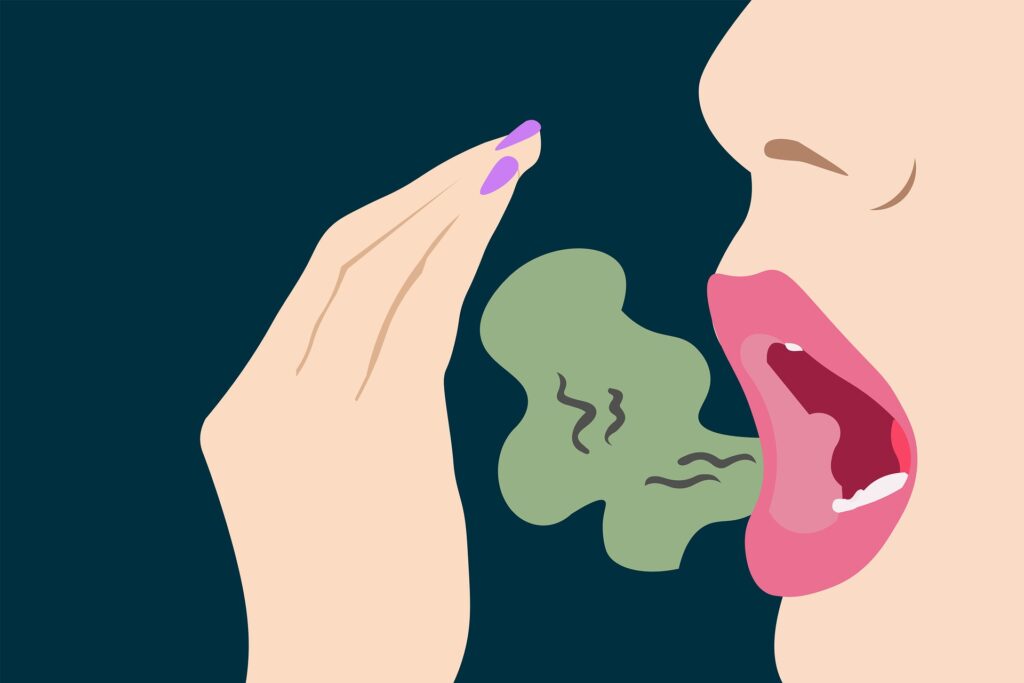Bad mouth breath, also known as halitosis, is a condition where an unpleasant odor emanates from a person’s mouth. It can be caused by various factors, such as:
- Poor Oral Hygiene: Neglecting oral hygiene can lead to the buildup of food particles and bacteria in the mouth, which may cause bad breath.
- Food and Drink: Certain foods, like onions, garlic, and certain spices, as well as beverages like coffee, can cause bad breath.
- Tobacco Products: Smoking and other tobacco products can cause chronic bad breath.
- Dry Mouth (Xerostomia): Saliva helps clean your mouth. If the mouth is naturally dry or dry due to specific medications, it can lead to bad breath.
- Infections in Your Mouth: Oral surgeries, tooth decay, gum disease, or mouth sores can cause bad breath.
- Other Mouth, Nose, and Throat Conditions: Sinus infections, throat infections, or other issues can contribute to bad breath.
- Certain Medications: Some medications, when they break down in the body, release chemicals that can cause breath odor.
- Health Conditions: Certain diseases, such as some cancers, liver failure, and metabolic disorders, can cause a distinctive breath odor.
11 Best Ways to Solve Bad Mouth Breath:
- Maintain Oral Hygiene: Brush at least twice a day and floss daily to remove food debris and plaque trapped between your teeth and gums.
- Clean Your Tongue: Your tongue hosts bacteria that can lead to bad breath. Use a tongue scraper or brush your tongue to clean it.
- Hydrate: Drinking water helps keep your mouth moist and stimulates saliva production, which is nature’s way of cleaning your mouth.
- Quit Smoking and Avoid Tobacco Products: Besides causing bad breath, smoking stains your teeth, irritates your gums, and can lead to various health problems.
- Avoid Certain Foods: If certain foods cause your bad breath, try to avoid them. These can include onions, garlic, certain spices, and coffee.
- Eat Healthy: Eating a healthy diet can help prevent bad breath. Certain foods like carrots, apples, and celery can help clean your teeth between meals.
- Use Mouthwash: Over-the-counter mouthwash can help kill bacteria or neutralize and mask bad breath. However, it’s not a permanent solution, as it only masks the odor temporarily.
- Regular Dentist Visits: Regular check-ups will allow your dentist to detect any problems such as gum disease or dry mouth and stop them before they become more serious.
- Chew Sugarless Gum: Chewing sugarless gum or sucking on sugarless candies can stimulate saliva flow, which helps to wash away food particles and bacteria.
- Check Your Dentures or Braces: If you wear braces or dentures, ensure they are cleaned daily. Plaque, food particles, and bacteria can accumulate on these appliances and cause bad breath.
- Seek Medical Help: If bad breath persists even after good oral hygiene, consult with a healthcare professional or a dentist. It could be a symptom of a medical disorder such as a sinus condition, gastric reflux, diabetes, liver or kidney disease.
Vtot 3, 1 Vtod
